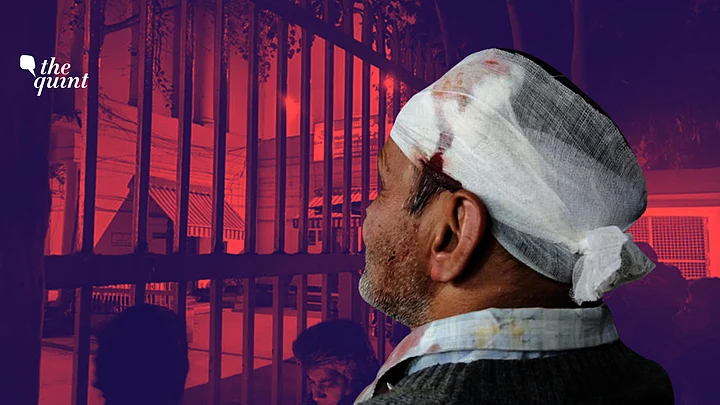Lost inside the massive Lok Nayak Jaiprakash Narain Hospital in Delhi at around midnight, Rukhsana stood crying in the lobby of the ground floor of the hospital. Her husband, Sadiq, was admitted to the hospital after suffering a head injury in the lathi-charge by the police at Delhi Gate on Friday, 20 December.
He is on the fifth floor of the hospital but the Delhi Police and hospital authorities have blocked many of the passages in the hospital, making it difficult for people to reach their kin admitted in different wards.
Rukhsana climbed five floors from two different sides, only to hit closed doors in both the cases.
But this is not how the day began for her. “My husband wore new clothes and new shoes and went for Friday prayers. He was planning to go for the protest after that. He was extremely enthusiastic when he went, saying that this (the protest) is important for us,” Rukhsana narrates.
Sadiq now has a blood clot in his head and is likely to be hospitalised for the next few days.
He is the sole earner in the family and Rukhsana has no support to bank upon.
“Will he be alright?” She keeps asking anyone who is willing to listen to her.
For Naseema* the traumatic day had a happy ending. For much of Friday night, Naseema, along with her mother-in-law and her infant daughter, had been sitting outside the Daryaganj Police Station, waiting for her husband Imran* – the only male member in their family – to be released. At around five in the morning, the police finally let Imran go.
The first thing he did after coming out of the gate of the police station was to pick up his daughter in his arms. The family didn’t even wait for activists to arrange for a cab or auto-rickshaw and went to the nearest bus stand.
“We just want to go home.”
Detainees’ Ordeal
Imran was among 50 people who are said to have been detained after the protests, a majority of who were released in the wee hours of 21 December.
Each of the released detainees has an ordeal to narrate.
“I was near the Daryaganj crossing when we came across a policeman standing near a private bus. ‘We’ll take you to Jamuna Paar,’ the policeman said. So we boarded the bus voluntarily as we had to go back home,” narrated Mohammad Shoaib* a resident of Mustafabad in North East Delhi.
“We thought the police was helping us. Little did we know that the bus would take us to the police station,” Shoaib said.
The same thing – boarding the private bus being handled by the police – happened to at least a dozen other detainees, all of whom were trying to get back home to their respective localities in North East Delhi such as Mustafabad, Jafrabad and Khajuri Khas.
Delhi Police, in fact, seems to have focused on protesters from North East Delhi, and not so much on those belonging to the Old City area. Remember, some of the most intense protests against the CAA in Delhi have taken place at Seelampur in North East Delhi.
The case of Akmal*, also from the same area, is similar.
“I often come to eat at the Jahangeer restaurant at Daryaganj, especially on Fridays. I was coming out of the restaurant when the police picked up me. I had no idea what was happening,” he said.
Yet another detainee who claims to have had nothing to do with the protests is Izhar*. He said that he had come to the area as part of his marketing job and maintains that he had nothing to do with the protests.
While most of the released detainees said the police did not hit them at the police station, a few of them were thrashed by the cops.
Salim* said that one policeman thrashed him with his belt. Unable to walk properly due to the beating, Salim hobbled towards a vehicle with the help of his family who had come to receive him.
Ikramuddin* also said that the police hit him on the hip with a lathi.
At least two detainees complained that one policeman thrashed them and forced them to chant “Jai Shri Ram”.
“He hit me and asked me to chant ‘Jai Shri Ram’. The other policemen asked him to stop. They often told him to leave as well as he was getting too aggressive,” one of them narrated.
One detainee said that a cop shouted at him, “You want Azadi? I’ll give it to you” while he was being picked up.
A minor who was detained was also hit by the police. He suffered a head injury and had to be treated at the LNJP Hospital.
The Quint saw the minor in one of the hospital wards, petrified, surrounded by policemen, with no family members around. His clothes had bloodstains and he was also finding it difficult to walk.
The minor’s father claims that after the release, the police asked him to sign a document which said that his son was “in good shape”. “How could I sign that he is in good shape, when clearly he suffered injuries?” his father told The Quint.
The suffering of Friday night wasn’t just restricted to the detainees and the injured protesters but also the police personnel. A number of injured policemen were being treated at the third floor of the LNJP Hospital.
“One of my colleagues has a large cut on his head. His eye is badly injured as well. Many cops were injured today,” a constable, attending to his colleague at the hospital, told The Quint.
*Some names have been changed to protect the identity of detainees.
(At The Quint, we question everything. Play an active role in shaping our journalism by becoming a member today.)
